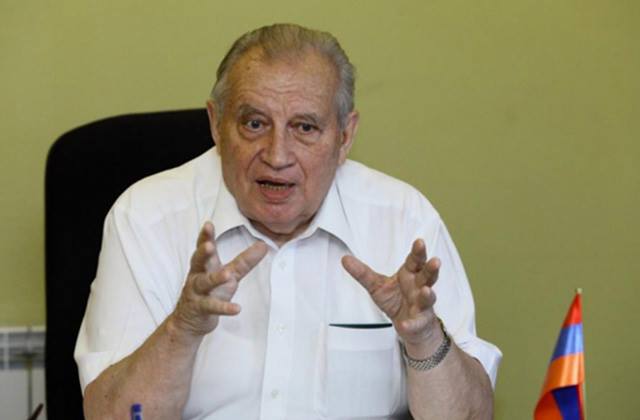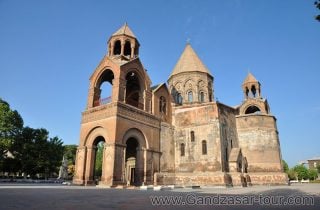One should have already got along with deadlock situations in NK negotiations: Kazimirov

After the two Sargsyan-Aliyev meetings following the April four-day war, negotiations on NK conflict peaceful settlement again appeared at a deadlock. “168 Hours” interviewed Vladimir Kazimirov, Russian diplomat, Plenipotentiary Representative of the Russian President for Political Settlement of the Conflict over Nagorno-Karabakh (1992–1996), former Russian OSCE MG Co-Chair, on ways to come out of the existent situation.
Mr. Kazimirov, weeks ago you participated in celebration of the 25th anniversary of Independence of Nagorno-Karabakh. Half a year has passed from the April military operations. What’s your assessment to the moods in Artsakh?
I participated in these events upon the invitiation of NKR president. Of course, I was in Karabakh throughout these days. It seemed to me that NKR population celebrated that day rather actively, with the participation of youth and former Karabakh war veterans. I only have kind and positive impressions from that visit. The greatest impression is that people learned lessons from the April war, are tended not to allow further sharpening on the contact line and people’s mood and posture to that direction is rather clear.
In your opinion, what lessons have they learned?
They learned the lesson, that the state of affairs on the negotiation table and the situation on Karabakh-Azerbaijan contact line requires particular attention, high soberness, as different intriguing, adventurous programs may continue formulating, thus, surely, high soberness is necessary not to allow outbreak of incidents on the contact line, moreover, outbreak of military operations and their generation.
Mr. Ambassador, after the April war the initiated active negotiation process, during which 2 presidential meetings have been organized, first in Vienna, and then in St. Petersburg, again appeared at a deadlock. What do you think, which is the reason for the existent deadlock at this stage?
One should get along with everything, as there is no clearness, there is no aspiration of the sides to settled the conflict, as they occurred so frequently and different outbreaks are taking place, which are progressing, naturally becoming difficult, and frequently even a few steps forward are being recorded, then again regression. It’s not new to me, I used to it even throughout the years of Artsakh war.
Particularly, one of the sides was being distinguished, when even the officially put signature by the country’s high representative, assumed responsibilities were implemented and didn’t obtain an unserious nature. How many incidents, signatures have been put under different texts, which remained unaccomplished. Even if we observe short-term ceasefire regimes, four likewise cases have been recorded, however, agreement was violated by the very sides, although short-term agreements have been touched upon.
Let’s observe current posture as well, how the sides referred to the 12 May 1994 agreement. It’s exclusively clear that one of the sides avoids recognizing its own liabilities, which refer to maintenance of ceasefire regime pursuant that agreement. It’s rather regretful, as when young states are violating the assumed responsibilities, of course, they don’t strengthen their authority in the eyes of the international community.
Mr. Kazimirov, under the existent situation a range of experts claim that Armenia, by not participating in negotiations, should urge the Co-Chairs, the international community to exert pressure on the Azerbaijani side, to accept the liabilities, assumed during the last two meetings. These days OSCE MG U.S. Co-Chair James Warlick stated that they hope that the presidents will again agree to meet. What leverages do the Co-Chairs have towards the sides? What can they do to bring out the situation from the deadlock?
The Co-Chairs are mediators, and they usually don’t have leverages for pressure. Of course, there are exceptions, however, there is considerable difference among those, who intend to assist to come to an agreement, and those, who exert pressure, i.e. in case of Dayton. However, relying on it, that the mediators will exert pressure on the sides, will urge to implement the assumed responsibilities, it’ll be a bit exaggeration. The mediators assist the sides to show flexibility, show conscious approaches. However, one can’t rely on mediators, that they’ll give a command and the sides will immediately follow that command, here functions are quite different.
Under this situation, what’s your assessment to the probability of a wide-scale war?
In any case, I intend to believe in human consciousness, it should be clear for the sides, that the new war is full of higher risks for peoples of both Azerbaijan and Armenia. Thus, in any case, I hope that resumption of military operations shouldn’t take place on a wider-scale. Those possible losses, victims are of utmost importance, which may be recorded in that case. Can the level of being armed be compared to 1991? Obviously, losses for each side will be more, than throughout the previous war.
By Araks Martirosyan

























